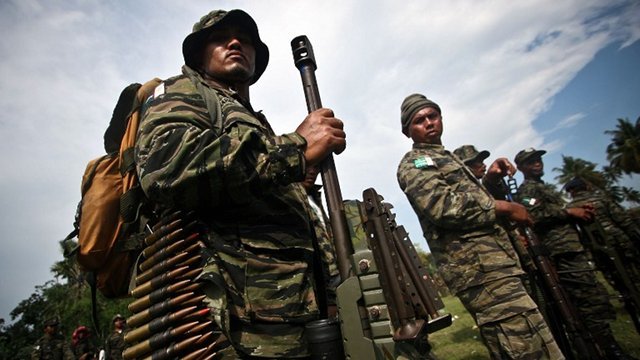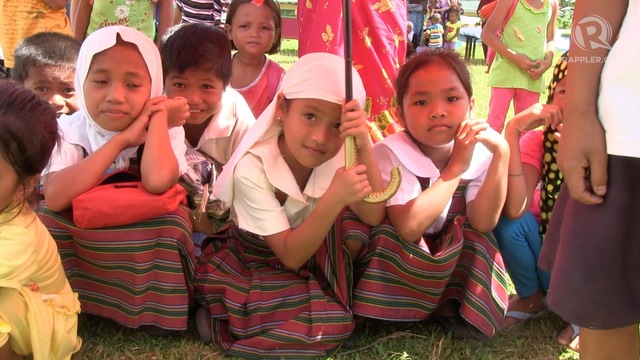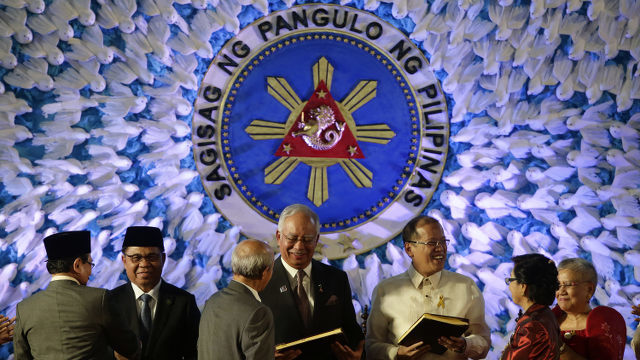Mobarak Hadji Yahya, now 33 and a father of 11, is in awe as soldiers help MILF rebels fix schools at Camp Bilal. Fifteen years ago, he took up arms against these forces.

ARMED CONFLICT. This photo taken on Oct 15, 2012 shows members of the Moro Islamic Liberation Front (MILF) standing in formation during a celebration inside Camp Darapanan in Sultan Kudarat town, in the southern island of Mindanao. Photo by Karlos Manlupig/AFP
LANAO DEL NORTE, Philippines – On his high school graduation day in 2000, Mobarak Hadji Yahya was holding a gun instead of his diploma.
He couldn’t leave his home inside Camp Bilal in Munai town, Lanao del Norte, some 47 kilometers away from his school in Iligan City. At the time, the government was unleashing an all-out war on the rebel Moro Islamic Liberation Front (MILF).
Mobarak had to fight alongside his father, Commander Hadji Yahya Locsadatu, the late vice chief of staff of the MILF’s Bangsamoro Islamic Armed Force (BIAF). Commander Yahya was defending Camp Bilal, the province's biggest MILF base, which would later be captured by the military.
Fifteen years later, on June 8, Camp Bilal was the setting for a rare occasion. For a day, government forces and MILF members set aside their firearms and trooped to communities in the MILF base to help fix schools as classes resumed in the area. Together, the soldiers and rebels built school fences and conducted a medical mission.
Among the visitors of the community were chief government peace negotiator Miriam Ferrer and members of the Coordinating Committee on the Cessation of Hostilities (CCCH) of the government and the MILF.
[Video report: Soldiers help fix schools in MILF camp
https://www.youtube.com/watch?v=gi-78BZpXb8]
War was his only choice
Mobarak was in awe as he watched the pupils in his village sing the Philippine national anthem at the start of the activity. Rows of soldiers and MILF members stood in attention within hailing distance.
It was a scene that did not cross Mobarak’s mind a decade and a half ago.
In his youth, to fight was his only choice. War was his nightmare, but it was also his source of pride.
“Sa utak namin dito, humawak na lang ng armas. Parang laruan talaga dito 'yon, e. Sikat ka kung nasa giyera ka. Parang ganoon 'yung kabataan dito noon,” recalled Mobarak. (You’re popular if you are in the battlefield. That was the mentality of the youth at that time.)
At the peak of the all-out war, Mobarak said he carried an M-60 machine gun, at times firing 300 rounds.
“Kung hindi ka magpapaputok, talagang hindi ka mabubuhay,” Mobarak said. (If you will not fire your gun at the enemy, you will not survive.)
Since the 1970s, the conflict in Mindanao has claimed at least 150,000 lives and left a huge part of Mindanao in abject poverty.
Scars of war
The scars of the Muslim rebellion are engraved on the walls of the abandoned two-story house where Mobarak grew up. The walls are covered in bullet holes and dents.
He recalled that morning when the military dropped a bomb on their house, shattering parts of it, including their bedroom. He was with his parents, siblings, and other fighters preparing for breakfast. They put up a fight, he said, but retreated to the cornfield at the back of the house.
“Muntik na kaming madale,” Mobarak said. (We almost got killed.)
The all-out-war in Mindanao under the administration of President Joseph Estrada displaced nearly a million, including the women, children, and the elderly in Camp Bilal. The war cost the government at least P1.3 billion, according to a study.
When the memorandum of agreement on ancestral domain (MOA-AD) under President Gloria Macapagal-Arroyo failed, more than half a million left their communities.
“Here, they remember the wars of 2000 and 2008. That’s what we’re told by the teachers and those who were affected by the bombings and disorder during that period. But because we’ve had a continuing ceasefire since 2010 under the Aquino administration, they saw what ceasefire can bring,” Ferrer told Rappler during her visit to Camp Bilal.
According to Ferrer, she visited the MILF base to help create new memories of a lasting peace for the children and the community in general.
On Tuesday, June 16, another gesture of cooperation between the government and the MILF will mark the ongoing peace process. The MILF will turnover the first batch of rebel firearms. The rebels to be decommissioned are veterans of the 2000 war under the Estrada administration.

LASTING PEACE. In MILF’s Camp Bilal, soldiers help build school fences, provide health services, and take pictures with children. Their message is to create new memories of a lasting peace for the kids. Photo by Voltaire Tupaz/Rappler
War was not the kind of life that his father wanted him and his siblings to live, according to Mobarak.
“Ayaw niya kasi ng giyera, eh. Iyon ang naoobserbahan ko sa kanya…Hindi ko makalimutan sa kanya yung sinabi niya: ‘Hindi ito gyera ng mga Muslim at Christian. Ito’y hindi pagkakaunawaan ng gobyerno at saka ng MILF,” Mobarak remembered his late father telling him.
(He didn’t want war. That’s my impression of him. I will never forget what he told us: "This is not a war between Muslims and Christians. This is a conflict between the government and the MILF.")
Now 33 and a father of 11, Mobarak pins his hope on the peace deal between the government and MILF signed in March 2014 after 17 years of negotiations. (READ: DOCUMENT: Bangsamoro basic primer)
“I tell my children
to study hard now because, as I understand it, under the BBL (Bangsamoro Basic Law), our children will be able to go to school, to any school they want,” Mubarak said in Filipino.
The BBL proposes to form a new autonomous region in Muslim Mindanao that is parliamentary in form, and with greater powers and resources than the one currently in place.

PEACE DEAL. Al Haj Murad Ebrahim, Moro Islamic Liberation Front (MILF) Chairman; Malaysian Prime Minister Najib Razak; Philippine president Benigno Aquino III and Secretary Teresita Quintos-Deles, Presidential Adviser on the Peace Process hold the documents following the signing of a final peace agreement between the Philippine government and the muslim rebel group inside the Malacanang presidential palace in Manila, the Philippines, March 27, 2014. Dennis Sabangan/ EPA
But the durability of peace in Mindanao is now being tested in the court of opinion and in Congress, where the discussion of the proposed Bangsamoro law has been delayed because of legal and legitimacy issues.
Public support on the bill eroded after the bloody incident that happened in Mamasapano town, Maguindanao, where 44 elite cops died and 11 others were wounded during a clash with combined forces of MILF and its breakaway group, the Bangsamoro Islamic Freedom Fighters (BIFF).
Senator Ferdinand "Bongbong" Marcos Jr, chair of the Senate committee on local government, announced in a privilege speech on June 3 he is rejecting the BBL and would introduce an alternative measure – most likely an amended version of the current law that created the Autonomous Region in Muslim Mindanao.
“Unfortunately, the BBL in its present form and substance will not bring us any closer to peace. Instead, it will lead us to perdition. Armed conflict will ensue. Blood will be shed. And when blood is shed, it will not distinguish between right and wrong; between young and old, neither between men and women, nor soldiers or rebels, combatants and civilians, rich, poor, Muslims, Christians,” Marcos said.
Marcos, together with other 11 senators, signed a committee report that found the proposed measure unconstitutional.
“Panahon pa ng tatay niya, giyera nang giyera na. Tapos giyera na naman ngayon. Hindi nila nararamdaman yung sakit na dinadanas ng taga-Mindanao,” Mobarak reminded the dicator’s son. (READ: Cardinal to Bongbong: Correct your father’s sins vs Muslims)
(The conflict has been there since his father's presidency. Now we’re going to war again. They don’t feel the misery that the people of Mindanao went through.)
“I hope politicians will not use the BBL,” Mubarak said, speaking in Filipino, “because it cost us blood.”
http://www.rappler.com/move-ph/issues/mindanao/96464-son-milf-rebel

No comments:
Post a Comment
Note: Only a member of this blog may post a comment.